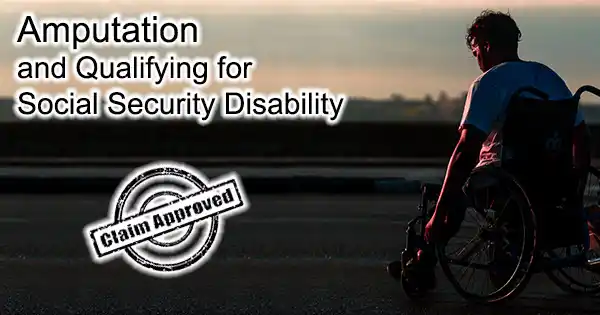Qualifying for Social Security Disability with an Amputation
Can I get disability benefits if I am suffering from the effects of an amputation?
Author Attorney Lloyd Bemis:
Approximately two million Americans are living with the loss of a limb. Amputation is the loss of one of the body’s extremities – an arm, leg, foot or hand – and can be the result of infection, vascular disease such as diabetes, or a traumatic event such as an auto accident.

Though prosthetics and medications have vastly improved the lives of amputees, many individuals still experience difficulty in carrying out the normal tasks of life. If a person is unable to work because of an amputation, they may be eligible for Social Security Disability benefits, but only under certain conditions.
Though prosthetics and medications have vastly improved the lives of amputees, many individuals still experience difficulty in carrying out the normal tasks of life.
If a person is unable to work because of an amputation, they may be eligible for Social Security Disability benefits, but only under certain conditions.
Amputations and Qualifying for Disability Benefits.
Some amputations automatically qualify for Social Security Disability benefits: the loss of both hands, one leg up to the hip or a pelvic amputation.
In its Blue Book, the Social Security Administration specifically acknowledges amputation as an impairment:
1.05 Amputation (due to any cause)
- Both hands;
- One or both lower extremities at or above the tarsal region, with stump complications resulting in medical inability to use a prosthetic device to ambulate effectively, as defined in 1.00B2b , which have lasted or are expected to last for at least 12 months;
- One hand and one lower extremity at or above the tarsal region, with inability to ambulate effectively, as defined in 1.00B2b;
- Hemipelvectomy or hip disarticulation.
or
or
or
Social Security defines functional loss as “the inability to ambulate effectively on a sustained basis for any reason, including pain associated with the underlying musculoskeletal impairment, or the inability to perform fine and gross movements effectively on a sustained basis for any reason, including pain associated with the underlying musculoskeletal impairment.
The inability to ambulate effectively or the inability to perform fine and gross movements effectively must have lasted, or be expected to last, for at least 12 months.”
Under these criteria, an applicant must be unable to:
- carry out daily tasks like going to school or work without assistance,
- climb a few steps
- walk at a reasonable pace for a short distance
- carry out normal activities like shopping
- walk on rough services
- use standard public transportation
- prepare a simple meal and feed oneself
Contact a Social Security disability attorney at 512-454-4000 for a free consultation and see if you can get disability benefits while suffering from the effects of an Amputation. If you have been denied disability don’t give up!
An applicant who has lost a limb is not guaranteed eligibility.
For example, if an individual with a leg amputated below the knee is able to walk with a prothesis, it is likely they will not be considered disabled. But if an applicant can demonstrate that their condition makes it impossible for them to work or severely restricts the work they can do, they may be approved for benefits. If you also have another medical condition, such as vascular disease, an amputation combined with that other impairment may improve your chances for being approved. As with other impairments, it is important to provide as much information as possible about your condition when applying for SSDI.
Still, you will need to show evidence detailing how severely the amputation has impacted your abilities, including:
- Which limb was amputated
- How the amputation affects your ability to walk (Do you need to use two canes or two crutches, a walker, or a wheelchair?)
- Your ability to go up and down stairs (Do you need to use a handrail?)
- Pain experienced relative to movement
- Difficulty performing daily tasks such as cooking, feeding yourself, shopping, personal care
- Your inability to travel without a companion to work or school
You will also need to provide the following medical documentation:
- All surgical records and complete operative reports
- Records detailing any complications resulting from surgery such as infections or blood clots
- X-rays, CT scans, MRIs, radio-nuclear bone scans, imaging results
- The amount of time that is expected before you can return to adequate ambulation (Social Security considers financial assistance if individual has not returned to adequate ambulation or is not expected to within one year)
- Medications, including doses and frequency
- Side effects of medications
- Physical or occupational therapy
- Changes in daily life as a result of amputation
In cases where an amputee does not automatically qualify for SSDI, the SSA will likely conduct a Residual Functioning Capacity (RFC) evaluation to determine what jobs the applicant is capable of performing.
Social Security will consider your amputation and any restrictions ordered by your doctor such as no kneeling or crawling. The SSA will also rate the type of work you can do – sedentary work, light work, medium work, or heavy work. This rating is important; the higher the RFC, the more jobs you can do; the lower the RFC, the fewer jobs you can do.
If the SSA decides you are unable to perform any jobs given your RFC, you may be approved for disability benefits under a medical-vocational allowance.
However, even if you have a low RFC, it may be difficult to qualify for disability benefits. Success will depend on your age, education and skills. For example, if you are literate, have a high school education and are under the age of 50, the SSA assumes you will be able to learn a new job, so your chances of getting disability through a medical-vocational allowance are low. But if you have a sedentary RFC, a high school education and limited skills, the SSA may approve benefits if you are over 50. If it’s determined that you are capable of medium work, you won’t be considered disabled unless you’re older than 55, have limited skills and less than a 6th grade education.
Qualifying for Social Security Disability as an amputee is not always a simple matter.
If you have suffered the loss of a limb and it has impacted your ability to work, you may be eligible for Social Security Disability benefits. To ensure success, it’s best to seek the counsel of a qualified disability attorney.
In order to qualify for Social Security Disability, you will need to satisfy a few specific requirements in two categories as determined by the Social Security Administration.
The first category is the Work Requirements which has two tests.
- The Duration of Work test. Whether you have worked long enough to be covered under SSDI.
- The Current Work Test. Whether you worked recently enough for the work to actually count toward coverage.
The second category is the Medical Eligibility Requirement.
- Are you working? Your disability must be “total”.
- Is your medical condition severe? Your disability must be “severe” enough to interfere with your ability to perform basic work-related activities, such as walking, sitting, and remembering.
- Is your medical condition on the List of Impairments? The SSA has a “List of Impairments” that automatically qualify as “severe” disabilities. If your disease is not listed this does not mean you cannot get disability, it means you must prove you cannot maintain employment due to your limitations.
- Can you do the work you did before? SSDI rules look at whether your medical condition prevents you from doing the work you did prior to developing the condition.
- Can you do any other type of work? If you cannot do your prior work, an evaluation is made as to whether you can perform any other kind of work.
More details can be found on our Qualifying for Disability page.
Disability benefits are an important source of income for those who are unable to work. If you not able to work due to accident or illness, you may be eligible for Social Security Disability or Long Term Disability benefits. If you have applied for benefits and been denied, contact the attorneys at Bemis, Roach and Reed for a free consultation. Call 512-454-4000 and get help NOW.
Qualifying for Disability with Diabetes
Post-Traumatic Stress Disorder and qualifying for disability assistance.
Paralysis and Qualifying for SS Disability Benefits

Your Free Initial Consultation
Call now:
At Bemis, Roach and Reed, if we can't help you, we will try to find the right attorneys for you.
We offer each of our prospective clients a free no obligation one hour phone or office consultation to see if we can help you and if you are comfortable with us. We know how difficult a time like this can be and how hard the decisions are. If we can be of assistance to you and help you find a solution to your issue we will, even if that means referring you to another attorney.
Let's get you Started:
If you could provide us with some basic information about your claim we will get right back with you with a free case evaluation and schedule your Free Consultation Today.
You can also email us at: contact@brrlaw.com
Kind Words from Our Clients
“The attorneys and staff at Bemis, Roach & Reed have provided me and my husband, Jeff, with stellar advice, care, and service. They made navigating the SSDI process easy, painless, and as timely as possible. During this difficult time in our lives it was a tremendous relief to know they were on our side and keeping us updated on next steps and timelines. We also had questions about my husband’s long term disability insurance and they helped us get those questions answered and resolved without any additional fee. I highly recommend Bemis, Roach & Reed.” – Kelli G
“I needed a lawyer for my case and had googled best lawyers. They came up first on my list and decided to give them a call. From the moment I called I knew I chose the right people. They said they would fight for me and fight they did. They knew what they were doing and kept good communication throughout the process. If you need someone that will listen, understand, and fight then these are the people. HIGHLY RECOMMEND.” – Marcel L.
“I’ve had a great experience working with Bemis, Roach & Reed for my disability case. I spent two years fighting on my own, until I was informed to look for a disability lawyer. Right away, sending in questions was a breeze, and from the moment my case was accepted, everything became a major weight off my shoulders. My newest appeal was filed for me, my medical records and case history sorted for me, and I could finally focus on my appointments and treatment with a little less worry. Everything was explained to me in a way that made sense, the process was set out in an easy to understand way. And, just like that, at the beginning of July 2023, my claim was accepted!” – Sunshinemutt







